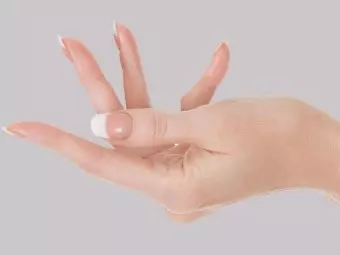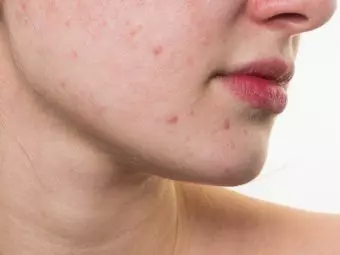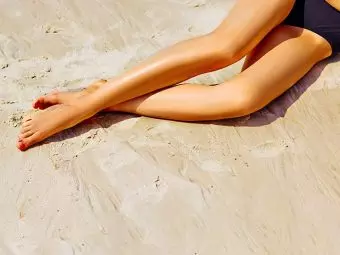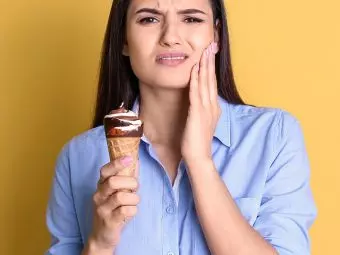Seasonal changes, dehydration, and other environmental stressors may sometimes lead to a dry nose. While this is nothing to worry about, certain natural remedies can help treat dry nose at home.
Your nose not only helps you breathe and smell but also helps keep the dust, dirt, and allergic pollens from entering your system. But a dry nose may cause difficulty in vision and trouble breathing. Along with the skin, your nose is among the body’s first lines of defense. Hence, it is important to keep it functioning well. The following remedies can help relieve dry nose. Check them out.
What Is A Dry Nose?
A dry nose occurs when the internal nasal passages dry out. This can also cause crusting of the inner nose mucosa (1).
Here are the most effective home remedies for dry nose you can try to get relief from the condition.
Dry Nose Home Remedies
1. Coconut Oil
Coconut oil can help moisturize the skin and fill the gaps between the dry cells (2). Applying it to the nostrils can help prevent dryness and reduce pain. Make sure not to overdo this remedy.
You Will Need
Virgin coconut oil
What You Have To Do
Pour a drop or two of coconut oil in each nostril.
How Often You Should Do This
Do this once a day.
2. Saline Spray
Saline or saltwater is a simple home remedy for a dry nose, and it can be easily prepared at home. The salt water acts as a humidifier and keeps the nasal lining hydrated. It helps in clearing out mucus and irritants in the nasal passage (3).
Caution: Do not use table salt as it may contain other additives that can irritate the nasal mucosa further.
You Will Need
- 1 teaspoon pure salt or sea salt
- 1/2 cup water
- Spray bottle
What You Have To Do
- Mix the salt with the water and pour this into the spray bottle.
- Bend your head towards the floor and spritz the salt water a few times into the nasal cavities.
- You can also take some of the saline water in your palm and inhale it so that it reaches as far as possible in the sinus cavities. Blow it out after 10 seconds.
- You can also purchase empty nasal spray bottles. Most drugstores sell saline nasal sprays over the counter.
How Often You Should Do This
Use the saline spray 3-4 times a day.
3. Vitamin E Oil
Vitamin E oil helps increase the hydration of the skin and has antioxidant and anti-inflammatory properties (4), (5). A study shows that alpha-tocopherol (a type of vitamin E) could help in the treatment of pollen-induced allergic rhinitis (6). Hence, it may hydrate the nasal mucosa, relieve dryness, and accelerate the healing process of the nasal passages.
You Will Need
Vitamin E capsules
What You Have To Do
- Pierce the vitamin E capsule.
- Tilt your head upwards and pour two to three drops of the oil into the nostrils.
How Often You Should Do This
Do this 2 times a day.
4. Olive Oil
Olive oil, like coconut oil, hydrates the skin inside the nasal passages, thus alleviating the dryness (7). It also relieves irritation and swelling (8).
You Will Need
- Virgin olive oil
- Dropper
What You Have To Do
Using the dropper, pour a few drops of olive oil in the nostrils.
How Often You Should Do This
Repeat this 2 times daily.
5. Sesame Oil
The vitamin E content of sesame oil is higher than that of most other oils. It is a great moisturizer for dry skin. In a study, sesame oil was proven to work better than the saline irrigation method to relieve nasal dryness (9).
You Will Need
- Organic sesame oil
- Dropper
What You Have To Do
- Tilt your head backward and pour a drop of sesame oil in each nostril.
- Inhale deeply so that the oil reaches the internal nasal passages.
How Often You Should Do This
Do this 2 times a day.
6. Steam
The easiest way to get rid of a dry nose is to inhale steam at regular intervals. This soothing remedy softens the dried mucus in the nasal passages (10).
You Will Need
- Hot water
- A large bowl/basin
- A big towel
What You Have To Do
- Pour the hot water in the bowl.
- Cover your head with the towel and inhale the steam from the bowl for about 10 minutes.
- Blow your nose gently after this.
How Often You Should Do This
Inhale steam 2-4 times a day.
7. Humidifier
Dryness in the environment can worsen a dry nose and trigger congestion. Maintaining humidity in the room where you spend most of the day is a necessity in frigid weather conditions.
Humidifiers or vaporizers are used to add moisture to the surroundings and can ease symptoms, such as irritation in the nose and dryness (11). In the absence of humidifiers, water-filled buckets can be placed near heating systems to create ambient humidity.
8. Sauna
Who doesn’t love a sauna bath? It is one of the best ways to treat dry nose and sore muscles. If you don’t prefer a sauna bath, simply heat a bath, add a few drops of aroma oil to it, and soak in its goodness for a few minutes. Do not stay in long unless you wish to get a leaky nose in exchange for a dry one.
Warning
One remedy that people often tend to resort to for obtaining relief from a dry nose is using petroleum jelly. However, this remedy is not recommended by doctors. The internal application of petroleum jelly has been linked to a type of pneumonia (12). Hence, steer clear of this home remedy.
Subscribe
Drying out of the internal nasal passages may lead to a dry nose. Seasonal changes, dehydration, and other environmental stressors may also contribute to the condition. A dry nose may cause difficulty in vision and trouble breathing. Use the home remedies mentioned above with a high-protein diet to help battle the infection and tackle a dry nose. If you experience any side effects, discontinue using the remedies immediately. Consult your doctor right away if the condition worsens to the point of bleeding and breathing difficulties.
Frequently Asked Questions
What causes a dry nose?
The common causes of a dry nose range from air conditioning and dehydration to the side effects of medications, such as decongestants and antihistamines.
Is a dry nose a serious symptom?
A dry nose results in nasal irritation, itching, swelling, wheezing, and bleeding from the nose. When this dryness lasts for more than 10 days, you should consult your doctor as it may indicate serious underlying conditions, such as Sjogren’s syndrome. Also, if you experience symptoms related to infections, such as high fever, nonstop bleeding, and lethargy, consult your doctor immediately.
What are the potential complications of a dry nose?
The potential complications of a dry nose include dry skin, blurred vision, skin rashes, wheezing, and other breathing problems.
What to eat and avoid to relieve a dry nose?
• Drink enough fluids. The depletion of body fluids makes the body tissues dry. Plenty of water is required to make the nasal tissues work efficiently. Drink a minimum of eight to ten glasses of water per day.
• Having hot and spicy food or liquid items, for example, chicken soup, can moisten the nostrils and give you some relief.
• Reduce your caffeine, alcohol, and salt intake as these are dehydrating agents. If you have a dry nose, avoid consuming these foods.
• Cut down on any medication that increases the dryness after consulting your doctor. Medications tend to dehydrate the body, which often causes dry nasal passages. Keep your body properly hydrated if you need to take a high dose of medicine due to any existing illness.
Sources
Articles on StyleCraze are backed by verified information from peer-reviewed and academic research papers, reputed organizations, research institutions, and medical associations to ensure accuracy and relevance. Check out our editorial policy for further details.
- Rhinitis Sicca, Dry Nose and Atrophic Rhinitis: A Review of the Literature, European Archives of Oto-rhino-laryngology, US National Library of Medicine, National Institutes of Health.
https://pubmed.ncbi.nlm.nih.gov/20878413 - A randomized double-blind controlled trial comparing extra virgin coconut oil with mineral oil as a moisturizer for mild to moderate xerosis, Dermatitis : contact, atopic, occupational, drug, US National Library of Medicine, National Institutes of Health.
https://www.ncbi.nlm.nih.gov/pubmed/15724344 - Saline Nasal Irrigation for Upper Respiratory Conditions, American Academy of Family Physicians, US National Library of Medicine, National Institutes of Health.
https://www.ncbi.nlm.nih.gov/pmc/articles/PMC2778074/ - Influence of vitamin E acetate on stratum corneum hydration, Arzneimittel-Forschung, US National Library of Medicine, National Institutes of Health.
https://www.ncbi.nlm.nih.gov/pubmed/9706379 - Evaluation of the antioxidant capacity and preventive effects of a topical emulsion and its vehicle control on the skin response to UV exposure, Skin Pharmacology and Physiology, US National Library of Medicine, National Institutes of Health.
https://www.ncbi.nlm.nih.gov/pubmed/16145283/ - Alpha-tocopherol acetate nasal spray in the treatment of pollen-induced allergic rhinitis, Allergo Journal International, SpringerLink.
https://link.springer.com/article/10.1007/s40629-018-0086-7 - Effect of olive and sunflower seed oil on the adult skin barrier: implications for neonatal skin care, Pediatric Dermatology, US National Library of Medicine, National Institutes of Health.
https://www.ncbi.nlm.nih.gov/pubmed/22995032 - Molecular mechanisms of inflammation. Anti-inflammatory benefits of virgin olive oil and the phenolic compound oleocanthal, Current Pharmaceutical Design, US National Library of Medicine, National Institutes of Health
https://www.ncbi.nlm.nih.gov/pubmed/21443487 - Pure sesame oil vs isotonic sodium chloride solution as treatment for dry nasal mucosa, Archives of Otolaryngology–Head & Neck Surgery, US National Library of Medicine, National Institutes of Health
https://www.ncbi.nlm.nih.gov/pubmed/11701073 - Treating chronic sinusitis, US National Library of Medicine, National Institutes of Health.
https://www.ncbi.nlm.nih.gov/books/NBK279484/ - Humidifiers and health, MedlinePlus, US National Library of Medicine, National Institutes of Health.
https://medlineplus.gov/ency/article/002104.htm - Not Your Typical Pneumonia: A Case of Exogenous Lipoid Pneumonia, Journal of General Internal Medicine, US National Library of Medicine, National Institutes of Health.
https://www.ncbi.nlm.nih.gov/pmc/articles/PMC2219803/
Related
The following two tabs change content below.
- Author
- Reviewer
Shaheen Naser
Shaheen holds a postgraduate degree in Human Genetics and Molecular Biology. She is a Geneticist with proficiency in Biotechnology, Immunology,… more
Dr. Abby Kramer
(DC)Dr. Kramer is a Chiropractor + Holistic Physician practicing in the Chicagoland area. She has been featured in various publications,… more



 10 Effective Home Remedies To Stop Peeling Of The Fingertips
10 Effective Home Remedies To Stop Peeling Of The Fingertips 6 Natural Ways To Treat Red Spots On Skin And Prevention Tips
6 Natural Ways To Treat Red Spots On Skin And Prevention Tips How To Get Rid Of Heat Bumps On The Legs – 10 Natural Ways
How To Get Rid Of Heat Bumps On The Legs – 10 Natural Ways How To Get Rid Of Cavities – 7 Home Remedies To Follow
How To Get Rid Of Cavities – 7 Home Remedies To Follow How To Get Rid Of A Hickey – 13 Simple And Effective Ways
How To Get Rid Of A Hickey – 13 Simple And Effective Ways 10 Home Remedies To Heal Adenomyosis + Causes And Diet
10 Home Remedies To Heal Adenomyosis + Causes And Diet 12 Ways To Naturally Gain Weight At Home
12 Ways To Naturally Gain Weight At Home How To Make Your Own Hand Sanitizer At Home & Tips To Use It
How To Make Your Own Hand Sanitizer At Home & Tips To Use It Anal Fissures: Treatment, Home Remedies, And Prevention Tips
Anal Fissures: Treatment, Home Remedies, And Prevention Tips